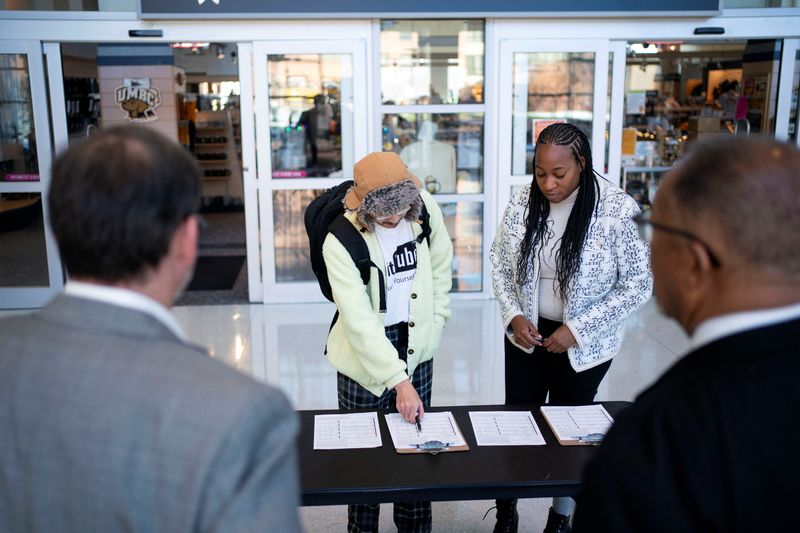
Factbox-How US states make it tough for third parties in elections
Factbox-How US states make it tough for third parties in elections By Reuters
Breaking News
‘;
Published Jan 18, 2024 06:18AM ET
Updated Jan 18, 2024 10:30AM ET
© Reuters. Dr. Benjamin Chavis Jr., national co-chair of No Labels, and Tyler Cymet, No Labels Maryland state co-chair, look on as a volunteer from No Labels, a third-party political group, collects signatures at the University of Maryland, Baltimore County, to gath
By Jarrett Renshaw
(Reuters) – For third-party U.S. presidential candidates, getting on state ballots is challenging and expensive, thanks to a patchwork of U.S. laws designed by Republicans and Democrats, the dominant parties which control statehouses nationwide.
In many cases, outsider challengers can seek to qualify either as an independent candidate or a candidate from a minor party, though not all states have multiple options. Conversely, Democratic and Republican candidates automatically get on ballots due to state laws that reward parties for voter support during previous elections.
Here is a summary of states with the most cumbersome ballot access laws, according to experts, including Richard Winger, co-editor of the newsletter Ballot Access News.
CALIFORNIA
To qualify as a minor party, an organization must collect 75,000 signatures from residents who are willing to switch parties or register for the first time.
An independent candidate must collect some 219,000 signatures – the most of any state – over a 105-day stretch that starts in April.
NEW YORK
In 2020, then-Governor Andrew Cuomo led an effort to modify the state’s ballot access law that changed the definition of a pre-qualified party, taking the Libertarian, Green and Independence parties off the ballot.
The petition requirement tripled to 45,000 signatures – including at least 500 in half of the state’s 26 congressional districts, but the six-week petitioning period remained the same.
TEXAS
Independent candidates must collect 113,151 signatures over a 70-day stretch that begins on May 13. Voters who participated in the Republican or Democratic presidential primary election, held on May 5, are disqualified from signing a petition.
A minor party must get 81,000 signatures over a 75-day stretch.
Last year, a federal judge blocked a 119-year-old state law that required independent and minor parties to collect the signatures on paper. The ruling is on hold while the case in under appeal.
INDIANA
An independent candidate must collect 36,944 signatures – or 2% of the vote count for secretary of state – by July 1. The 2% requirement is tied with Wyoming as the highest percentage of a previous election tally in the country.
There is only one way to get on the ballot
WEST VIRGINIA
An independent candidate must collect 7,948 signatures by Aug. 1 and register in each of the state’s 55 counties where they want to collect signatures.
ARIZONA
An independent candidate needs to collect some 43,000 signatures to qualify for the ballot 90 days before the general election.
The path for a minor party requires fewer signatures at 34,116, but they must be submitted a whole year prior to the election.
FLORIDA
An independent candidate needs 145,040 signatures to get on the state’s presidential ballot.
A minor party doesn’t require any signatures, but their national committee must be recognized by the Federal Election Commission (FEC), which has only recognized eight parties’ national committees.
MAINE
A minor party seeking to qualify for Maine’s presidential ballot must collect 5,000 signatures from residents willing to ditch their current party registration or register for the first time. Only a handful of states require residents to switch parties.
No Labels and Maine Secretary of State Shenna Bellows clashed after Bellows, a Democrat, issued a letter to residents who signed the No Labels paperwork to advise them that they had switched parties. About 800 Maine voters rescinded their enrollment after the letter was issued, according to the state.
Despite that, No Labels officially qualified for the state’s ballot earlier this month.
An independent candidate must collect between 4,000 and 5,000 signatures to be on the ballot.
Factbox-How US states make it tough for third parties in elections
Terms And Conditions
Privacy Policy
Risk Warning
Do not sell my personal information
© 2007-2024 Fusion Media Limited. All Rights Reserved.
Risk Disclosure: Trading in financial instruments and/or cryptocurrencies involves high risks including the risk of losing some, or all, of your investment amount, and may not be suitable for all investors. Prices of cryptocurrencies are extremely volatile and may be affected by external factors such as financial, regulatory or political events. Trading on margin increases the financial risks.Before deciding to trade in financial instrument or cryptocurrencies you should be fully informed of the risks and costs associated with trading the financial markets, carefully consider your investment objectives, level of experience, and risk appetite, and seek professional advice where needed.Fusion Media would like to remind you that the data contained in this website is not necessarily real-time nor accurate. The data and prices on the website are not necessarily provided by any market or exchange, but may be provided by market makers, and so prices may not be accurate and may differ from the actual price at any given market, meaning prices are indicative and not appropriate for trading purposes. Fusion Media and any provider of the data contained in this website will not accept liability for any loss or damage as a result of your trading, or your reliance on the information contained within this website.It is prohibited to use, store, reproduce, display, modify, transmit or distribute the data contained in this website without the explicit prior written permission of Fusion Media and/or the data provider. All intellectual property rights are reserved by the providers and/or the exchange providing the data contained in this website.Fusion Media may be compensated by the advertisers that appear on the website, based on your interaction with the advertisements or advertisers.



